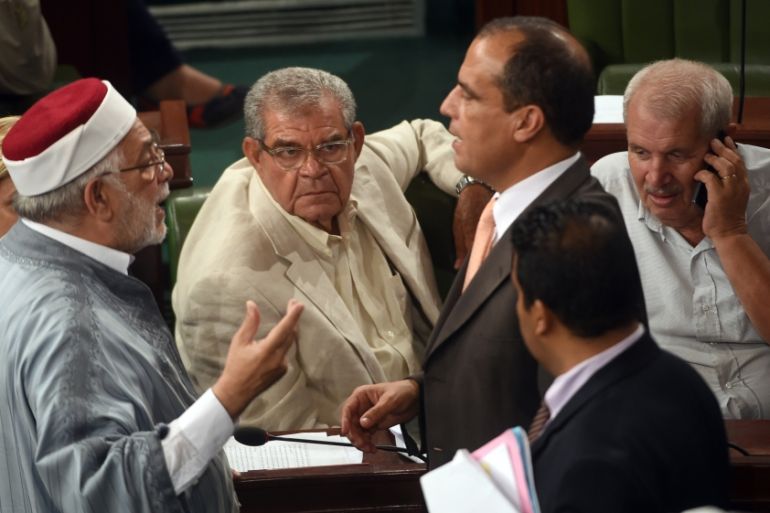Analysis: The identity crisis in Tunisia’s ruling party
As rising internal struggles grip the leadership of Nidaa Tounes, is Tunisia’s nascent democracy at risk of collapse?

The only success story of the Arab Spring may be at risk if the ruling Nidaa Tounes party devolves into smaller conflicting groups.
Rising internal struggles within the party are seriously threatening its unity and its ability to remain in power. If Nidaa Tounes fails to overcome its internal rifts and survive as one party, the already fragile and controversial governing coalition will not likely survive either.
|
|
The essence of the latest crisis within the ruling party is not new; rather, it has deep roots in the party’s DNA. The secularist Nidaa Tounes was created primarily to counter the domination of the Islamist Ennahdha party.
The fear factor brought together leftists and figures from Tunisia’s old regime to form a new party after Ennahdha won the first post-revolution election.
RELATED: Tunisia results confirm Nidaa Tounes win
Because post-revolution transitions are usually characterised by uncertainty and rapidly changing circumstances, the fear factor can play a crucial role. Fear creates new realities by temporarily blurring traditional contradictions – but when it comes to delivering results and building long-term and stable institutions, those contradictions resurface. This is precisely the type of crisis Nidaa Tounes is currently facing.
After winning the 2014 parliamentary and presidential elections and emerging as the strongest party with 86 seats out of 217, Nidaa Tounes found itself in a paradoxical situation. The radical anti-Islamist political discourse around which its electoral campaign revolved – mobilising members and supporters across the country – rapidly faded away, only to be replaced by an opposite discourse.
Instead of disposing of Ennahdha and reducing its influence, as the party leadership had promised, Nidaa Tounes had to form a coalition government in which the Islamists took part.
This was an unexpected development that many in the party could not digest or tolerate, especially after the party’s charismatic founding father, Beji Caid Essebsi, became president and left Nidaa Tounes. The new leadership has been struggling to create harmony and find common ground among its members.
The question now is no longer whether the ruling party will implode, but when will this happen ... What will be the consequences of these developments on the new Tunisian political setting, which promised to present us with the first genuine model of Arab democracy?
The ongoing crisis is certainly a crisis of leadership and a struggle for power, but it is also a crisis of identity, which the new party has so far failed to shape.
Contrary to some analyses that have tended to focus on rivalries between leading figures, the crisis within Nidaa Tounes is multifaceted and complex. There might be a conflict between two approaches to leadership, but this is only one side of the story. It would be erroneous and misleading to reduce the current crisis to a competition between an institutional approach, led by the party’s secretary-general, Mohsen Marzouk, and a hereditary one, led by the president’s son, Hafedh Caid Essebsi.
Behind this apparent competition lies an ideological divide between the leftist faction, which opposes any rapprochement between Nidaa Tounes and Ennahdha, and the so-called Destourian faction, which sees no alternative for the new political system to survive without the two parties working together.
RELATED: Tunisia’s confident secularists weigh options
There is also a rift between those who own the funds and control the party machinery and those who try to create new circles and networks of supporters to counter their influence. This rift has to be seen in light of the growing struggle over representation in the upcoming congress.
Finally, there is an external factor: While the crisis within Nidaa Tounes is primarily internal, it also reflects a much broader conflict between regional and international sponsors. Instead of helping the party preserve its unity and consolidate its leading position in the Tunisian political scene, these sponsors – whether in the neighbourhood, the Gulf or the West – seem to be prioritising their own competing and conflicting agendas.
The question now is no longer whether the ruling party will implode, but when will this happen – especially after the recent attempt by a group of 30 MPs to break away and form their own party. What will be the consequences of these developments on the new Tunisian political setting, which promised to present us with the first genuine model of Arab democracy?
Ezzeddine Abdelmoula is the Manager of Research for the Al Jazeera Centre for Studies.